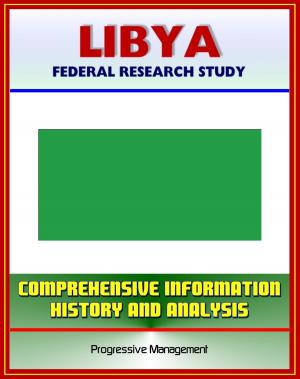Putin's Propaganda War: Is He Winning? 2018 Analysis of Belarus, Kazakhstan, Latvia, France, Germany, and Finland Highlighting Source of Russian Influence, Fighting Kremlin's Information War
Nonfiction, History, Asian, Former Soviet Republics, Russia| Author: | Progressive Management | ISBN: | 9780463081679 |
| Publisher: | Progressive Management | Publication: | June 7, 2018 |
| Imprint: | Smashwords Edition | Language: | English |
| Author: | Progressive Management |
| ISBN: | 9780463081679 |
| Publisher: | Progressive Management |
| Publication: | June 7, 2018 |
| Imprint: | Smashwords Edition |
| Language: | English |
This excellent 2018 report has been professionally converted for accurate flowing-text e-book format reproduction.
Following its invasion of Ukraine, Russia has executed an information campaign that could fundamentally change its role on the international scene. Vladimir Putin, through his use of hybrid tactics, has orchestrated a narrative painting ethnic Russians throughout Moscow's near-abroad as victims of the West, which, he claims, wants to dictate immoral social practices and policies of political domination against Slavic civilization generally and Russia more specifically. Ultimately, this thesis addresses whether Russia is winning the propaganda war, and if so, where it has managed to claim victories. Putin's attempts to co-opt populations in Russia's near-abroad and in Europe have yielded varying degrees of success, but largely limited to former Soviet bloc republics. By analyzing six countries (Belarus, Kazakhstan, Latvia, France, Germany, and Finland) across two different regions, this thesis highlights the sources of Putin's influence as well as areas of weakness. Its conclusion suggests policies for uniting and strengthening the fight by both the United States and Europe against the Kremlin's information war, including education, tightening of access to Western media outlets, and counter-measures based on fact-checked narratives.
I. INTRODUCTION * A. MAJOR RESEARCH QUESTION * B. SIGNIFICANCE OF THE RESEARCH QUESTION * C. LITERATURE REVIEW * D. POTENTIAL EXPLANATIONS AND HYPOTHESES * E. RESEARCH DESIGN * F. THESIS OVERVIEW AND DRAFT CHAPTER OUTLINE * II. RUSSIA'S PROPAGANDA EFFECTIVENESS IN THE NEAR-ABROAD * A. THE UKRAINIAN CRISIS IN BRIEF * B. BELARUS, KAZAKHSTAN, AND LATVIA * 1. Belarus and Russia's Relations * 2. Public Opinion in Belarus on Ukraine Crisis * 3. Policy Implications for Belarus * 4. Kazakhstan and Russia's Relations * 5. Public Opinion in Kazakhstan on Ukraine Crisis * 6. Policy Implications for Kazakhstan * 7. Latvia and Russia's Relations * 8. Public Opinion in Latvia on Ukraine Crisis * 9. Policy Implications for Latvia * C. CONCLUSION * III. EUROPE AND PUTIN'S PROPAGANDA * A. FRANCE, GERMANY, AND FINLAND * 1. Franco-Russian Relations * 2. Public Opinion in France on Ukraine Crisis * 3. Policy Implications for France * 4. German-Russian Relations * 5. Public Opinion in Germany on Ukraine Crisis * 6. Policy Implications for Germany * 7. Finno-Russian Relations * 8. Public Opinion in Finland on Ukraine Crisis * 9. Policy Implications for Finland. * B. CONCLUSION * IV. CONCLUSION * A. SO, IS RUSSIA WINNING THE PROPAGANDA WAR? * B. IN WHAT WAYS IS RUSSIA WINNING THE PROPAGANDA WAR? * C. HOW TO COMBAT THE RUSSIAN PROPAGANDA * D. POLICY RECOMMENDATIONS FOR THE U.S. AND EUROPE * LIST OF REFERENCES
This excellent 2018 report has been professionally converted for accurate flowing-text e-book format reproduction.
Following its invasion of Ukraine, Russia has executed an information campaign that could fundamentally change its role on the international scene. Vladimir Putin, through his use of hybrid tactics, has orchestrated a narrative painting ethnic Russians throughout Moscow's near-abroad as victims of the West, which, he claims, wants to dictate immoral social practices and policies of political domination against Slavic civilization generally and Russia more specifically. Ultimately, this thesis addresses whether Russia is winning the propaganda war, and if so, where it has managed to claim victories. Putin's attempts to co-opt populations in Russia's near-abroad and in Europe have yielded varying degrees of success, but largely limited to former Soviet bloc republics. By analyzing six countries (Belarus, Kazakhstan, Latvia, France, Germany, and Finland) across two different regions, this thesis highlights the sources of Putin's influence as well as areas of weakness. Its conclusion suggests policies for uniting and strengthening the fight by both the United States and Europe against the Kremlin's information war, including education, tightening of access to Western media outlets, and counter-measures based on fact-checked narratives.
I. INTRODUCTION * A. MAJOR RESEARCH QUESTION * B. SIGNIFICANCE OF THE RESEARCH QUESTION * C. LITERATURE REVIEW * D. POTENTIAL EXPLANATIONS AND HYPOTHESES * E. RESEARCH DESIGN * F. THESIS OVERVIEW AND DRAFT CHAPTER OUTLINE * II. RUSSIA'S PROPAGANDA EFFECTIVENESS IN THE NEAR-ABROAD * A. THE UKRAINIAN CRISIS IN BRIEF * B. BELARUS, KAZAKHSTAN, AND LATVIA * 1. Belarus and Russia's Relations * 2. Public Opinion in Belarus on Ukraine Crisis * 3. Policy Implications for Belarus * 4. Kazakhstan and Russia's Relations * 5. Public Opinion in Kazakhstan on Ukraine Crisis * 6. Policy Implications for Kazakhstan * 7. Latvia and Russia's Relations * 8. Public Opinion in Latvia on Ukraine Crisis * 9. Policy Implications for Latvia * C. CONCLUSION * III. EUROPE AND PUTIN'S PROPAGANDA * A. FRANCE, GERMANY, AND FINLAND * 1. Franco-Russian Relations * 2. Public Opinion in France on Ukraine Crisis * 3. Policy Implications for France * 4. German-Russian Relations * 5. Public Opinion in Germany on Ukraine Crisis * 6. Policy Implications for Germany * 7. Finno-Russian Relations * 8. Public Opinion in Finland on Ukraine Crisis * 9. Policy Implications for Finland. * B. CONCLUSION * IV. CONCLUSION * A. SO, IS RUSSIA WINNING THE PROPAGANDA WAR? * B. IN WHAT WAYS IS RUSSIA WINNING THE PROPAGANDA WAR? * C. HOW TO COMBAT THE RUSSIAN PROPAGANDA * D. POLICY RECOMMENDATIONS FOR THE U.S. AND EUROPE * LIST OF REFERENCES















